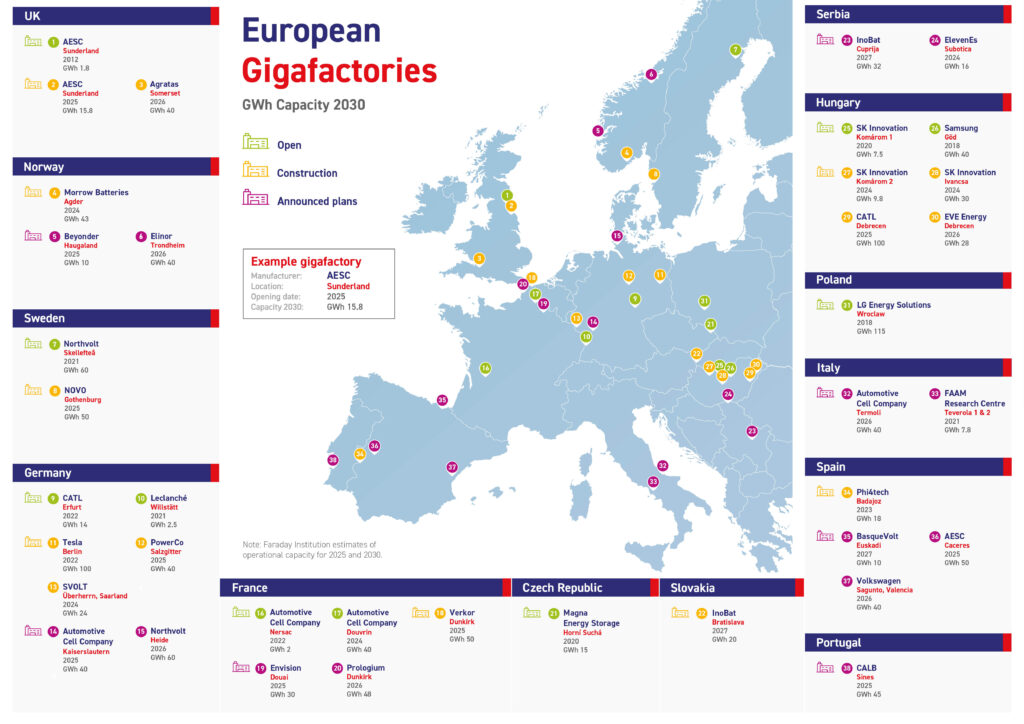Recent announcements showcase the UK as an attractive location for battery manufacturing, but redoubling of efforts are needed to keep pace with investments across Europe
HARWELL, UK (17 September 2024) – In an update to its 2022 study, the Faraday Institution predicts that by 2030, the UK will need the equivalent of six gigafactories (large, high volume battery manufacturing facilities) each producing 20 GWh per year of batteries. By 2040, the demand is expected to rise to the equivalent of 10 such gigafactories. This demand could be met by fewer, larger gigafactories reaching the same total capacity.
Recent gigafactory announcements in the UK by AESC and Tata Group have built excitement about the potential to create a new, dynamic and highly skilled battery industry in the UK. The report finds that 270,000 UK jobs could be supported by the EV and battery industry to 2040.
These announcements showcase the UK as an attractive location for battery manufacturing companies to build their European plants. The UK is making progress but not moving fast enough compared to its European competitors. UK battery manufacturing plants announced or under construction are expected to reach a combined capacity of 57.6 GWh by 2030, equivalent to around 4% of total European GWh capacity, behind Germany (21%), and six other countries.
More needs to be done.
At present, 47% of the projected demand for UK batteries to 2030 remains unaddressed by existing gigafactory development plans. Furthermore, 71% of the demand projected to 2040 has yet to be met.
Download the report, UK Electric Vehicle and Battery Production Potential to 2040.
The UK Government previously put in place a strategy and implemented a wide range of policies and incentives to help create a new battery manufacturing industry in the UK. For example, the UK Battery Strategy adopts a Design-Build-Sustain approach to enhance innovation, manufacturing and sustainability across the battery ecosystem.
Timely and coordinated efforts are still needed from the UK Government and industry stakeholders to attract more gigafactories into the UK. Developing a resilient, sustainable and efficient supply chain alongside building up skills capability will also be critical to securing the future of the UK automotive industry.
Minister for Industry and Decarbonisation Sarah Jones said: “The UK has a thriving auto industry that employs over 150,000 people. Our modern Industrial Strategy will build on this legacy, and bring growth, jobs and opportunities to every part of the UK. We continue to work with investors and industry through our Automotive Transformation Fund (ATF) to progress plans to build a globally competitive electric vehicle supply chain here in the UK, including work on unlocking crucial investment in gigafactories.”
Stephen Gifford, Chief Economist, Faraday Institution said: “There is a growing sense of optimism that a highly productive and sustainable battery manufacturing industry can be built in the UK. By 2040, a successful industry could employ 170,000 people in EV manufacturing, 35,000 people in gigafactories and 65,000 people in the battery supply chain.”
Professor Martin Freer, CEO, Faraday Institution said: “Next-generation batteries – such as solid-state, lithium-sulfur and sodium-ion technologies – offer the UK an opportunity to take a market-leading position globally in applications beyond automotive. By building on current advantages – cutting edge research and world-leading companies – the UK could establish a large-scale domestic manufacturing capability. But the UK must move quickly to exploit its competitive advantage.”
Matt Howard, Chief Strategy Officer, Faraday Institution said: “The move to electrify transport and toward large-scale battery production represents a massive shift in industrial skills. The UK’s engineering and manufacturing workforce can gain a competitive edge over other countries through the provision of a national training curriculum that will ensure the right skills are delivered at the right place and the right time.”
Continued efforts needed
Concerted and coordinated efforts will be needed to improve the competitiveness of the UK and position the UK as a leader in cutting-edge battery technology through action in the following areas:
- Attract inward investment to establish new gigafactories and expand existing plants in the UK, enhancing large-scale battery manufacturing capabilities and positioning the UK as a competitive player in the European battery market.
- Strengthen component manufacturing within the UK, focusing on producing vital battery components such as cathodes, anodes, electrolytes, separators and cell casings, to comply with trade agreements and improve supply chain efficiency.
- Invest in the development of UK-based refining and processing facilities for key battery materials such as lithium, nickel, cobalt and graphite to enhance the self-sufficiency of the UK battery supply chain and reduce reliance on imports.
- Enhance supply chain resilience by securing critical raw materials from international agreements with the USA, Canada, Australia and lithium-triangle countries in South America and by establishing a competitive lithium battery recycling industry in the UK.
- Accelerate the exploration and commercial extraction of key battery materials within the UK, especially for lithium and graphite, to reduce dependence on imports and ensure a steady supply of raw materials critical for battery manufacturing.
- Provide long term commitment to mission-based research into batteries that are cheaper, lighter weight, longer-lasting, safer, manufacturable and fully recyclable.
- Intensify investment in pioneering research into next generation battery technologies such as solid-state, sodium-ion and lithium-sulfur.
- Strengthen initiatives to commercialise innovative battery technologies through strategic partnerships and collaboration, focusing on accelerating the path to market readiness.
Summary of changes in key outputs of the report
Key changes in assumptions and modelling in the Faraday Institution’s 2024 report relative to the 2022 study are:
- Using the most up-to-date data on UK EV and internal combustion engine (ICE) vehicle sales and a review of industry forecasts.
- Reflecting the slower than previously expected recovery in the automotive industry after the global pandemic.
- Consideration of the UK Government’s announcement in September 2023, which set out a path for all new cars and vans to be zero emission by 2035.
The result of these key changes for the 2024 report relative to the 2022 study are:
- Demand for UK EV battery manufacturing capacity of around 110 GWh per annum in 2030 is slightly higher than the previous report (2022 report: 100 GWh per annum).
- Demand for the equivalent of six UK gigafactories in the UK by 2030, with each factory having a manufacturing capacity of 20 GWh p.a. on average (2022 report: five gigafactories producing 20 GWh p.a.).
- 200 GWh demand and 10 gigafactories for 2040 remains the same.
- UK automotive industry is projected to manufacture around 1.6 million private cars and commercial vehicles in 2040 (2022 report 1.8 million in 2040).
##Ends##
Notes to Editors
About the Faraday Institution
The Faraday Institution is the UK’s independent institute for electrochemical energy storage research, skills development, market analysis, and early-stage commercialisation. Bringing together expertise from universities and industry, the Faraday Institution endeavours to make the UK the go-to place for the research and development of new electrical storage technologies for both the automotive and wider relevant sectors. Headquartered at the Harwell Science and Innovation Campus, the Faraday Institution is a registered charity with an independent board of trustees, and a delivery partner for the Faraday Battery Challenge.
For more information on the Faraday Institution, visit www.faraday.ac.uk and follow @FaradayInst on twitter (X).
The Faraday Battery Challenge at UK Research and Innovation is delivered by Innovate UK. The Challenge is making the UK a science and innovation superpower for batteries, supporting the UK’s world-class battery facilities along with growing innovative businesses that are developing the battery supply chain for our future prosperity. Its aim is to build a high-tech, high-value, high-skill battery industry in the UK.
About UK Research and Innovation
UK Research and Innovation (UKRI) is the largest public funder of research and innovation in the UK, with a budget of around £8bn. It is composed of seven disciplinary research councils, Innovate UK and Research England.
We operate across the whole country and work with our many partners in higher education, research organisations businesses, government, and charities.
Our vision is for an outstanding research and innovation system in the UK that gives everyone the opportunity to contribute and to benefit, enriching lives locally, nationally and internationally.
Our mission is to convene, catalyse and invest in close collaboration with others to build a thriving, inclusive research and innovation system that connects discovery to prosperity and public good.
www.ukri.org
Media Contact:
Louise Gould
01235 425127 (office)
07741 853073 (mobile)







